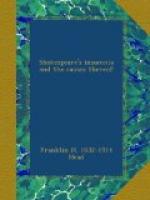The meagre information we have as to the life and habits of Shakespeare would seem to make it an almost hopeless task now to discover the causes of his insomnia. He wrote a marvellous body of literature, and it might be thought this labor itself would suffice as an explanation: that the furnace heat in which the conceptions of Hamlet and Macbeth and Lear were wrought in the crucible of his brain would be fatal to repose. But his contemporaries speak of him as an easy and rapid writer; one whose imagination is only paralleled by the ease, the force and beauty of the phrase in which it is embodied. We are told, too, by Dr. H.A. Johnson, an eminent medical authority, in the second volume of his treatise on the pathology of the optic nerve, that it is not work, even heavy and continuous, but worry over this work, which drives away repose and shortens life.
I had observed, in collating the many passages in Shakespeare concerning sleep, that the greater number, and those bearing evidence of deepest earnestness, occurred in six plays: “Richard III.,” “Macbeth,” “1 Henry IV.,” “Hamlet,” “2 Henry IV.,” and “Henry V.” The chronology of Shakespeare’s plays seems almost hopeless, scarcely any two writers agreeing as to the order of the plays or the years in which they were written. Several of the most critical authorities, however,—Dyce, White, Furnival, and Halliwell-Phillipps,—are agreed that two of the plays above named were written in 1593, three in 1602, and one in 1609. This would seem to indicate that during these three years unusual perplexities or anxieties had surrounded our author; and on noting this, it occurred to me that on these points the series of papers recently discovered and called the Southampton manuscripts, which are not yet published, might give light. I accordingly addressed a letter to the Director of the British Museum, where the manuscripts are placed for safe keeping, and received the following reply:—
British museum,
office of chief curator, department
of manuscripts,
London, Feb. 14, 1886.
Sir,—I am
directed by the Curator to acknowledge the receipt
of
your valued favor of February
1, transmitting for preservation and
reference in the library of
this institution—
1. The manuscript of
the farewell address of Dr. Charles Gilman
Smith, on his retirement to
private life from the presidency of the
Chicago Literary Club;
2. The manuscript of
the inaugural address of his successor in the
office,—which is
a public trust,—James S. Norton, Esq.;
3. An affidavit of Dr.
W.F. Poole, that both manuscripts are
originals, and in the handwriting
of their eminent authors.




